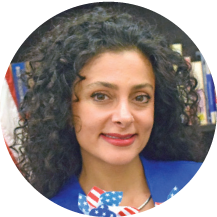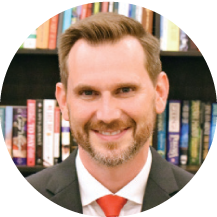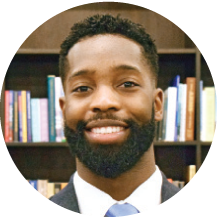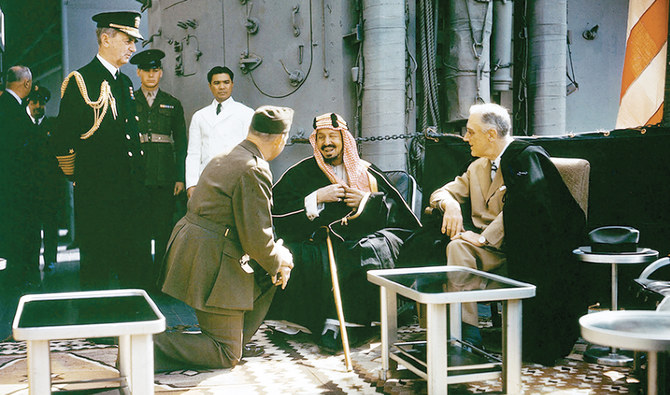 Jenny Abamu
Jenny Abamu
Public Diplomacy Officer
Growing up in Texas, the 4th of July was often spent with barbecue and fireworks in the park. Though I love barbecue under the Texas sun, the 4th of July means more than cookouts to me as an adult.
Independence Day is a time to celebrate how far our country has come and to reflect on how much work we have left to do. As a woman of color, I cannot overlook that it was not until much later that people who looked like me experienced the freedom promised within the Declaration of Independence. But, with the onset of the new Juneteenth holiday, and so many other changes, it is clear that our society is striving to live up to the moral ideals it was founded upon.
And, on this 4th of July, as a US diplomat posted in Jeddah, I reflect on how proud I am to be an American. I am proud of the work we do in countries around the world. I am proud of how our country bears our stars and stripes metaphorically and literally for the world to see. And I am proud of how much our country has done to hold our founding fathers to their promise that “all men are created equal, that they are endowed by their creator with certain unalienable rights, that among these are life, liberty and the pursuit of happiness.” Happy 4th of July!
 Lidia Kiorkis-Stephan
Lidia Kiorkis-Stephan
Chief of American Citizen Services
July 4th is a historical marker that celebrates the birth of the US as an independent nation. To me, it is a symbolic marker that represents what our nation stands for and what it aspires to be still. It is a reminder that while we may not be perfect, there is still so much that our nation has to celebrate. The 4th of July is a powerful reminder to me that we are stronger when we are united. My parents immigrated to the US seeking rights for their children to enjoy and treasure, and Independence Day is a homage to that.
Growing up in Chicago, I celebrated July 4th with friends, family, and neighbors over barbecue and ice cream into the evening hours of the hot and muggy summer night, filled with the laughter and joyful screams of children playing outside. The splendid fireworks represent the sparkling diversity and beauty of my hometown and the US. July 4th is about love for family, for neighbors, and for the nation. Happy 4th of July to all of my fellow Americans!
 Noah Cunningham
Noah Cunningham
Public Diplomacy Officer
Muggy Mississippi summers, lightning bugs, barbecue, and bottle rockets. As a child, Independence Day was a time for family gatherings and fireworks. All of my cousins would come to our house because we had a big front yard. My grandfather would give us his lit cigarettes to set off fireworks. We threw snap and pops, had bottle rocket wars, and shot roman candles at each other. Thinking back, I am amazed no one ever got hurt beyond occasional bumps and bruises or a minor burn on the finger.
As an adult, on July 4th, I reflect on what Independence Day means to my identity and the identity of the US. We are a diverse country, ever striving for the ideals of our founding freedom, equal opportunity for all, and self-governance through democratically elected leaders. I still love fireworks, fireflies, and barbecue. I love my American traditions. And I love my country, with all its bumps and bruises and finger burns.
 Colleen Quigley
Colleen Quigley
Consular Officer
For me, the 4th of July is about celebrating the values on which our country was founded: Equality, liberty, and democracy. It is a time to celebrate and honor the people who have dedicated their lives to our country and have worked to better realize these values at home and around the world. The fireworks, barbecues, and parades that happen every year bring us together to remind us of our history and that though we are many, we are one.
 Cyprian Christian
Cyprian Christian
Economic Officer
When I think of the 4th of July, images of the famous red, white, and blue “firecracker” popsicle come to mind. I hear the sounds of block party music at the various community barbecues in the neighborhood. Coming from Harlem, New York, a neighborhood rich in Black-American history, the 4th of July brings me many emotions.
In the upper west side of New York City, most people live in small, tight-knit apartments, meaning any party in one apartment becomes a communal event by nature of proximity. Whether it is conscious or not, we in Harlem see neighborhood gatherings as affinity entrenched in Black struggle, perseverance, and celebration.
The traditional American holiday cookout has its roots in the cooperation between Black and indigenous peoples struggling to get or keep their freedom from colonialists. And though Black-Americans did not attain freedom on Independence Day, the founding fathers famously expressed that “all men are created equal.” That statement and the values which it embodies underscored America’s succeeding comparative advantage as a nation of immigrants and a melting pot of cultures that coexist through its trials and tribulations.
Why does this matter? I thought we were talking about popsicles and music. Well, as a Black-American abroad, I, along with many Black brothers and sisters, am often posed the seemingly innocuous but flawed question, “Where are you really from?” The answer is and will forever be the US. Black-American culture is a unique byproduct of American Independence and the creation of a diverse country.
Therefore, the 4th of July commenced an ongoing journey wherein the US continuously challenges itself and the world to uphold universal civil liberties and human rights for all. For that reason, I am honored to be a US diplomat promoting these values at home first, then abroad.
















